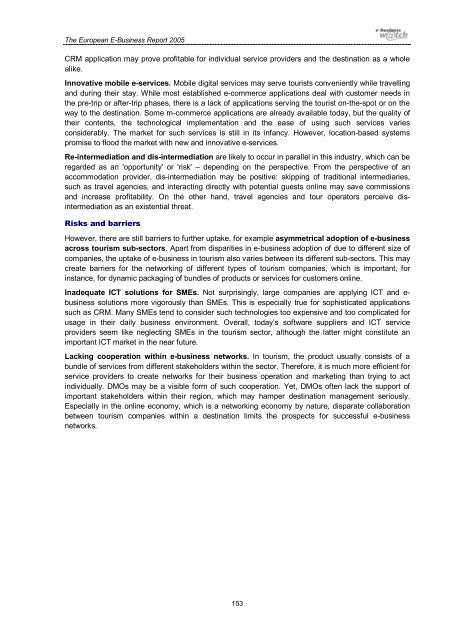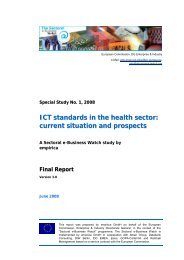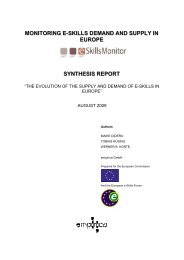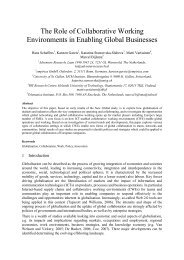The European e-Business Report The European e ... - empirica
The European e-Business Report The European e ... - empirica
The European e-Business Report The European e ... - empirica
You also want an ePaper? Increase the reach of your titles
YUMPU automatically turns print PDFs into web optimized ePapers that Google loves.
<strong>The</strong> <strong>European</strong> E-<strong>Business</strong> <strong>Report</strong> 2005<br />
CRM application may prove profitable for individual service providers and the destination as a whole<br />
alike.<br />
Innovative mobile e-services. Mobile digital services may serve tourists conveniently while travelling<br />
and during their stay. While most established e-commerce applications deal with customer needs in<br />
the pre-trip or after-trip phases, there is a lack of applications serving the tourist on-the-spot or on the<br />
way to the destination. Some m-commerce applications are already available today, but the quality of<br />
their contents, the technological implementation and the ease of using such services varies<br />
considerably. <strong>The</strong> market for such services is still in its infancy. However, location-based systems<br />
promise to flood the market with new and innovative e-services.<br />
Re-intermediation and dis-intermediation are likely to occur in parallel in this industry, which can be<br />
regarded as an 'opportunity' or 'risk' – depending on the perspective. From the perspective of an<br />
accommodation provider, dis-intermediation may be positive: skipping of traditional intermediaries,<br />
such as travel agencies, and interacting directly with potential guests online may save commissions<br />
and increase profitability. On the other hand, travel agencies and tour operators perceive disintermediation<br />
as an existential threat.<br />
Risks and barriers<br />
However, there are still barriers to further uptake, for example asymmetrical adoption of e-business<br />
across tourism sub-sectors. Apart from disparities in e-business adoption of due to different size of<br />
companies, the uptake of e-business in tourism also varies between its different sub-sectors. This may<br />
create barriers for the networking of different types of tourism companies, which is important, for<br />
instance, for dynamic packaging of bundles of products or services for customers online.<br />
Inadequate ICT solutions for SMEs. Not surprisingly, large companies are applying ICT and e-<br />
business solutions more vigorously than SMEs. This is especially true for sophisticated applications<br />
such as CRM. Many SMEs tend to consider such technologies too expensive and too complicated for<br />
usage in their daily business environment. Overall, today’s software suppliers and ICT service<br />
providers seem like neglecting SMEs in the tourism sector, although the latter might constitute an<br />
important ICT market in the near future.<br />
Lacking cooperation within e-business networks. In tourism, the product usually consists of a<br />
bundle of services from different stakeholders within the sector. <strong>The</strong>refore, it is much more efficient for<br />
service providers to create networks for their business operation and marketing than trying to act<br />
individually. DMOs may be a visible form of such cooperation. Yet, DMOs often lack the support of<br />
important stakeholders within their region, which may hamper destination management seriously.<br />
Especially in the online economy, which is a networking economy by nature, disparate collaboration<br />
between tourism companies within a destination limits the prospects for successful e-business<br />
networks.<br />
153

















